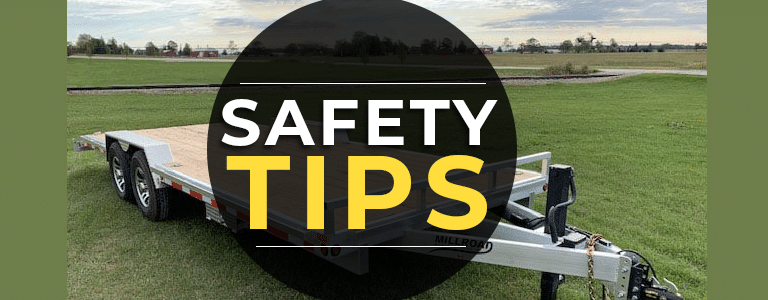
January 18, 2021 Last updated on June 16, 2023 by Bob Fisher Bob Fisher Aluminum Trailers, Flatdeck Trailers
No matter how experienced a driver you are or how long you’ve been towing, safety tips are important. It is common to either not be aware of some dangers when towing for the first time or to take a few of them for granted after towing for a very long time. Because of this, a refresher can help to keep you and other road users safe while towing your aluminum flat deck trailer.
Towing safety begins with your tow vehicle. Have you been keeping up with servicing the vehicle? When was the last time you balanced and rotated the tires or got an oil change? The Ministry of Transportation in Ontario also requires annual inspections for personal-use trucks and trailers. Check to see what your local requirements are. Note that some vehicles require daily inspections, such as school-purpose vehicles and commercial passenger vehicles.
If you have ever owned an RV, you have probably seen the warning, “Wheel separation may occur.” Canadian officials are aware of this problem, but hold drivers responsible for wheel separation and the injuries or damages caused. Fines can be as high as $5,000 in Ontario. Be sure to check your wheels before and after trips. If you have an especially long trip, check wheels when you stop for gas.
Local road rules and norms can vary across jurisdictions. This may determine how you treat specific signs or who has the right of way. If you plan to tow your aluminum flat deck trailer outside of your local area, know what to expect. Remember that it is always much more difficult to stop when towing, especially when your tow vehicle and trailer are packed.
Weather conditions can also contribute to how easy it is to tow your trailer. Check to see if you will have ice or snow in your intended destination. If there are areas where you may need to tow uphill or downhill with a load, reconsider the route. In some cases, you may need to put that trip off, altogether. As the old saying goes: better safe than sorry.
Most people agree that towing can be dangerous, when on the road. However, how and why you tow could create hazards when parked. These could cause slips, trips and falls. Consider the potential hazards associated with your load and lifestyle and plan accordingly to prevent these from posing a threat to yourself and others. This is especially important if you are transporting chemically hazardous material.
Failing to secure your loads could put you and other road users at risk. Unsecured loads could fall into the road and create accidents or become dangerous projectiles for pedestrians. Sometimes, loads merely shift but remain on the trailer. Even this can become dangerous because it affects the way the trailer behaves. Uneven loads can cause trailer sway or even jackknife, in some conditions.
If you have not towed with your specific tow vehicle before, assume your vehicle will use at least twice as much gas. This may be overkill, but it can keep you out of trouble. Some seasoned towers travel with extra gas jugs and keep them filled. Others ensure they fill up at half tank and plan routes that reduce long stretches of no gas services. Keep an eye on your gas gauge and how many hours or miles you’ve travelled, so you can better estimate gas mileage over time.
Whether you tow for work or play, the experience can be an exciting one. Keep it exciting for all the right reasons by following these and other safety tips. Note that safety includes the specific trailer you buy and its build quality. Check out our high-quality flatbeds trailer inventory today.